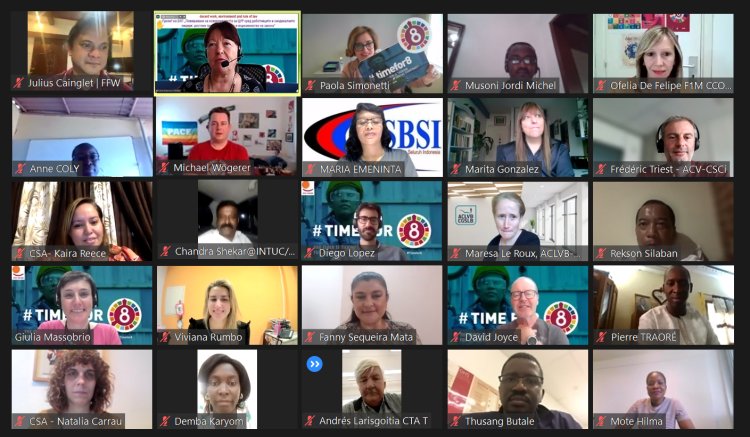The General Meeting was organised at a time when the United Nations (UN) is calling for “rescuing the SDGs”, given the severe backdrops in their implementation, exacerbated by Covid-19 and the conflict in Ukraine. In this context, the meeting was a timely opportunity for the members of the network to strategise on ways to accelerate action and achieve the SDGs by 2030.
The meeting began with a dialogue with Ms Beate Andres, Special Representative to the United Nations and Director of the ILO Office in New York. By analysing key UN processes – such as the report Our Common Agenda and the Global Accelerator on jobs and social protection for just transitions - Ms. Andrees showed that decent work has become central to the UN agenda and stressed the key role of the social partners in its implementation.
“Very impressed by the commitment of trade union leaders of the TUDCN to promote the SDGs and Our Common Agenda. They are key stakeholders of the global accelerator on jobs and social protection for just transitions,” tweeted Ms Andrees after the meeting.
The second day of the meeting focused on financing the SDGs and included interventions by the general secretary of the ITUC, Ms Sharan Burrow, and Mr Navid Hanif, the Director of the UN Financing for Development Office.
Ms Burrow highlighted the convergence of multiple crises in the form of historical levels of inequality, environmental degradation, the impact of the pandemic, and the growing number of conflicts. At the same time, she emphasised that financing the SDGs is possible, if we build an inclusive multilateral system that can provide strengthened development cooperation with debt relief, fair taxation and trade rules that allow policy space for industrial policy, business accountability and anti-corruption measures.
Following Ms Burrow’s intervention, Mr Hanif called for addressing the "great finance divide” between countries in responding to the pandemic, as “developed countries can lend at one per cent, developing countries must lend at eight per cent and above”. He also highlighted the effect of COVID -19 on global unemployment and the protracting effect that global inflation is having on debt, increasing the risk for a new debt crisis.
Mr Hanif also stressed the important contribution of trade unions in financing development policies by participating in national development plans and their financial framework; keeping governments and employers accountable for their commitment; promoting a fair distribution of income including through the extension of social protection; and advocating for a just transition.
“The SDGs are not out of reach because it is the policy-making that we choose that will bring us there. This is the moment to show conviction, persuade policymakers to make the right policies” he concluded.
Based on these inputs, the General Meeting also provided a space to share the main outcomes of trade unions’ work on the SDGs and on development cooperation policies. The network’s workplan for the next year was also approved to further strengthen the role of trade unions in development policies from the national to the global level.
- The background information and full report are available here


